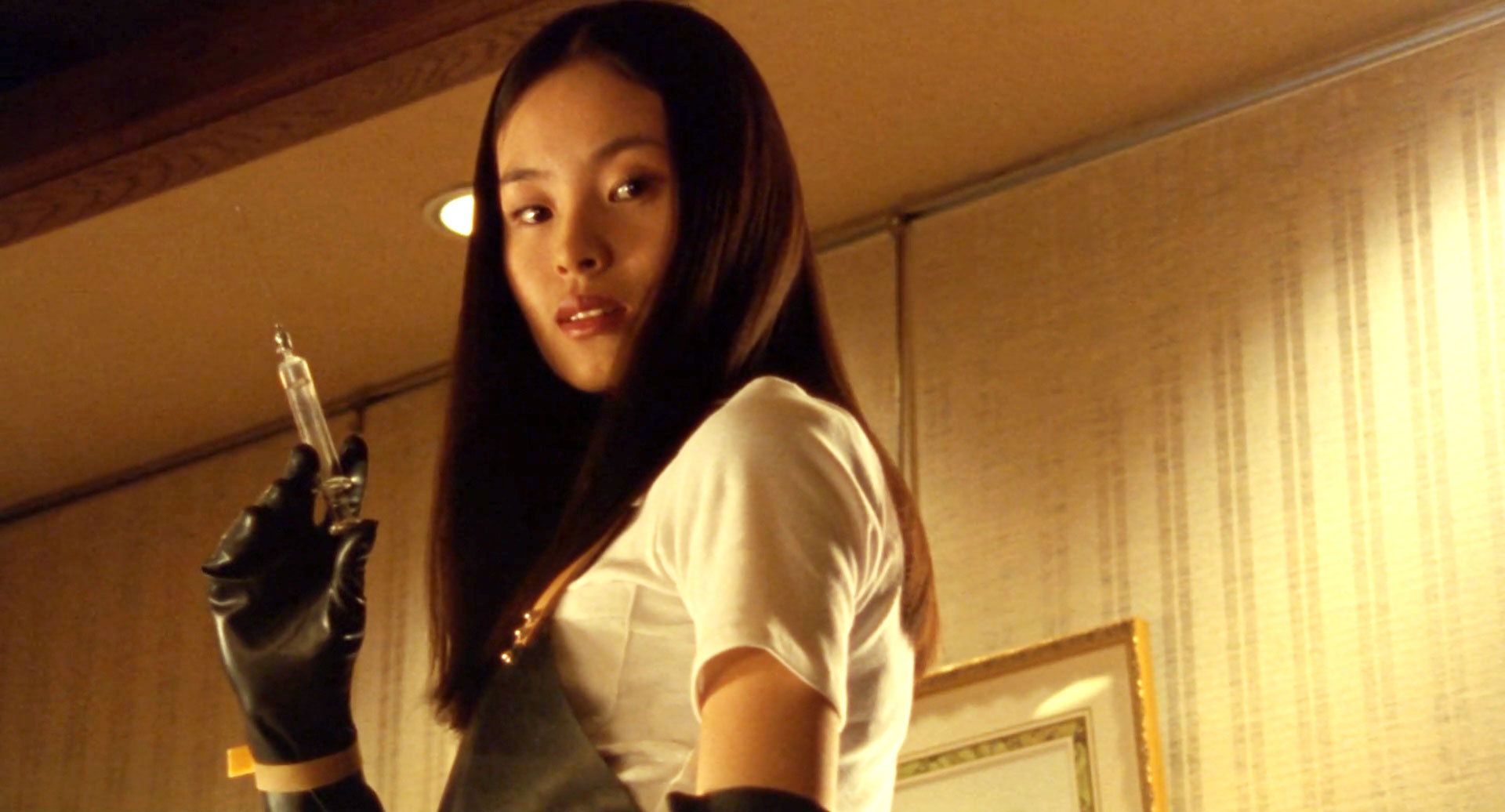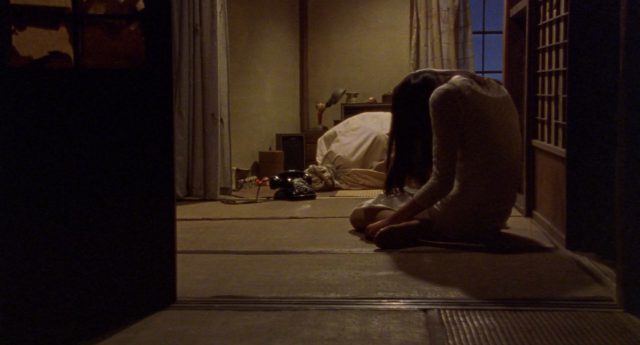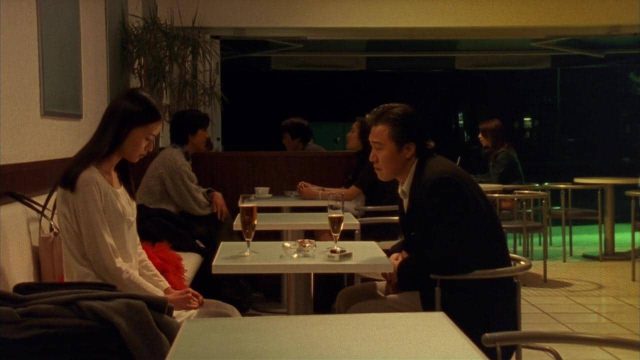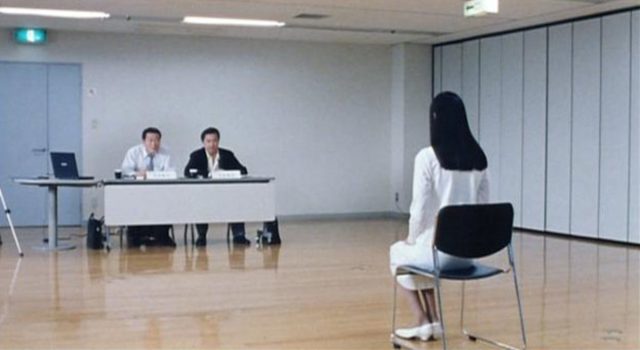
In the hushed corridors of grief-stricken Tokyo, where the weight of loss lingers like cigarette smoke in a dimly lit office, Audition unfurls as Takashi Miike’s stomach-turning masterpiece of romantic-comedy clichés laced with the insidious chill of J-horror. This 1999 fever dream, adapted from Ryu Murakami’s novel, masquerades as a tender widower’s quest for love before metastasising into a furious howl of despair, dissecting the patriarchal underbelly of modern Japan with scabrous satire and unyielding precision. At its core slithers Aoyama (Ryo Ishibashi), a soft-spoken film producer in his late forties, still adrift seven years after his wife’s untimely death from illness, his days a monotonous reel of editing sessions and solitary dinners, punctuated by the gentle prodding of his teenage son, Shigehiko (Tetsu Sawaki). Shigehiko, a lanky boy with a mop of dark hair and eyes shadowed by premature wisdom, urges his father to remarry, his voice cracking with the awkward protectiveness of youth, yet laced with the casual objectification of women absorbed from a world that treats them as elusive prizes.
“You need a woman to take care of you,” he says, his words a filial echo of societal scripts that bind men to passivity and women to servitude.
Enter Yoshikawa (Jun Kunimura), Aoyama’s wry, chain-smoking film partner, a co-conspirator in creative banalities who hatches a scheme as audacious as it is ethically bankrupt: stage a phony casting call for a nonexistent melodrama, complete with a script of whispered affections and doe-eyed obedience, to sift through a parade of hopefuls for the perfect, pliant bride. The auditions unfold in a sterile conference room bathed in fluorescent pallor, where aspiring actresses recite lines like liturgical vows—”I want to be the wind in the willows that sways at your window”—their voices a chorus of desperation and delusion. Amid this parade of performative vulnerability, Aoyama’s gaze locks onto Asami (Eihi Shiina), a waifish former ballerina in her early twenties, her porcelain skin and cropped black hair framing eyes that gleam with an affectless intelligence, like polished obsidian reflecting unspoken voids. Abandoned by injury and a cruel mentor who severed her tendons in a fit of possessive rage, Asami has retreated into a limbo of temp work and unanswered phone calls, her apartment a shadowed sanctum of faded dance posters and a lone rotary dial that hums with phantom rings. She embodies the ideal Aoyama—and Yoshikawa—covet: demure, doe-like, her responses a silken thread of subservience that masks the coiled wiry frame beneath, a body honed by discipline yet scarred by betrayal.
Miike, ever the provocateur, lulls us into this setup with the languid grace of a slow-burn romance, his camera gliding through Tokyo’s rain-slicked streets and minimalist interiors in unhurried long takes that mimic the inertia of mourning. Aoyama’s world is one of muted grays and soft blues—elegant sushi bars where sake flows like forgotten tears, alleyways whispering with the patter of distant downpours—building an atmosphere of aching solitude that feels almost therapeutic. Yet beneath this veneer simmers a critique as sharp as a hidden needle: the gulf between men and women, where males like Aoyama drift in oblivious entitlement, viewing females as “others” to be procured and enjoyed at convenience, their pains dismissed as inconvenient static. Shigehiko’s offhand leers at swimsuit models in magazines, Yoshikawa’s jovial complicity in the ruse—these are the banal misogynies Miike skewers, not with preachiness but with the creeping dread of inevitability, as if the air itself thickens with the residue of unacknowledged cruelties.
As Aoyama courts Asami, their dates unfold like fragile dioramas: a seaside picnic where she feeds him rice with trembling fingers, her laughter a fragile chime that belies the voids in her gaze; a quiet dinner where she confesses her orphaned past, her voice a monotone hymn to endurance, stirring in Aoyama a masochistic pity that borders on arousal. He discards his loyal assistant, a woman whose affections he never truly saw, in a casual phone call that echoes the disposability he now risks embodying. Miike’s patience here is masterful, a psychological study rich in ironies, where the romantic idyll curdles imperceptibly—restaurants shifting from white sterility to inflamed reds, shadows lengthening like accusations, Asami’s apartment glimpsed in fleeting cuts: a burlap sack twitching in the corner, a piano tuned to dissonant minor keys. Her smile, when the phone finally rings, curls into something blood-freezing, a cooing wraith in waiting, transforming the narrative from rom-com farce to horror noir.
Deeper still, Audition excavates the rot of gender hostilities, Asami emerging not as villain but avenger—a demonic femme fatale bent on the cure for male arrogance, her vengeance a reckoning for the abuses that forged her, from severed dreams to societal erasure. Miike stages this exorcism with galvanising calm, free-associative hallucinations bleeding into reality during Aoyama’s descent: visions of interchangeable women as harbingers of longing and pain, his body a canvas for the pins of retribution, the saw’s whine a symphony of pent-up rage. It’s a brutal examination of social isolation and malaise, where love’s pursuit reveals itself as predation, and the line between predator and prey dissolves in a haze of mutual despair. Shigehiko’s peripheral anguish, Yoshikawa’s fading echoes—they orbit Aoyama’s unraveling like ghosts of complicity, underscoring how misogyny’s tendrils entwine generations.
In its final throes, Audition transcends genre, becoming a satirical scalpel on the soul of masculinity, its violence not gratuitous but cathartic, a howl against the boundaries that irreconcilably separate the sexes. Miike’s launchpad for J-horror pulses with that rare alchemy: the truly horrible made mesmerising, a stomach-turning reminder that beneath every demure facade lurks the fury of the forsaken.



